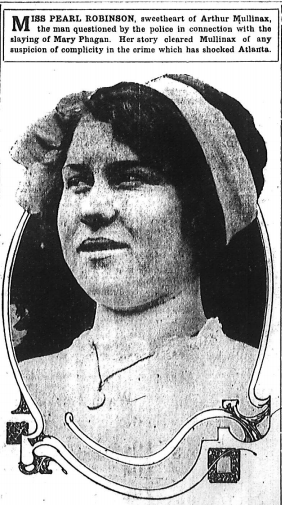
Another in our series of new transcriptions of contemporary articles on the Leo Frank case.
Atlanta Georgian
Tuesday, April 29th, 1913
Brave little Pearl Robinson!
Her loyalty and devotion to Arthur Mullinax, one of the four men held in connection with the brutal strangling of Mary Phagan, form the only bright feature in a sordid and revolting crime.
What did she care for the stares of the groups of people that hung about the detective headquarters when the life of her lover appeared to be in danger?
What did she care for the remarks that were directed at her when she pushed and shoved her way through the morbid crowds awaiting for a new sensation?
What difference did it make to her that her name instantly would be on the lips of everyone as the defendant of a man pointed out by one witness as the mysterious person with little Mary Phagan the last time she was seen alive?
Love Gave Her Courage.
It was the ages-old story of a woman’s heart refusing to believe any ill of the man to whom it is pledged and devoted.
In the young heart of pretty Pearl Robinson was implanted that eternally feminine and eternally remarkable attribute as deeply as though she were twice her 16 years.
She knew Arthur Mullinax, liked him, probably loved him with the implicit trust of a woman. He had been good to her, kind to her and always gentle and courteous. That was enough. He could not have been guilty of the terrible deed that has shocked a community as it has not been shocked in years.
And she was not afraid to tell to the world her confidence in the innocence of the man toward whom the wavering and shifting finger of suspicion had pointed at various times since the authorities began following out the many clews of the baffling mystery.
She was astounded, overcome, when she read that Mullinax had been held in connection with the gruesome killing. How could they associate him with such an act—that of a fiend and beast? When the first shock had passed she was all action. She would tell the officers their mistake. She had no sooner made up her mind than she proceeded to carry out her intention.
“Arthur Did Not Do It!”
A few minutes later she was in the office of Chief of Detectives Lanford. She was surrounded by sharp-eyed and keen-minded detectives. That did not disconcert her in the least. She trembled from the thoughts of the terrible crime with which the name of her lover had been linked, but not from any fear of the guilt of him she had come to defend.
“Arthur did not commit that awful deed,” she told Chief Lanford, in a positive and not-to-be-contradicted manner.
That settled it. She had said the final word. Of course, she went on and told of his movements on the night of the tragedy, and with the aid of his landlady established a very strong alibi. But that was incidental in her mind. All that mattered and was of consequence was what her heart told her—“Arthur did not do it.”
* * *
Atlanta Georgian, April 29th 1913, “Loyalty Sends Girl to Defend Mullinax,” Leo Frank case newspaper article series (Original PDF)